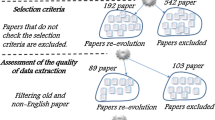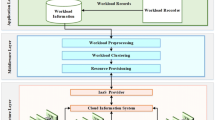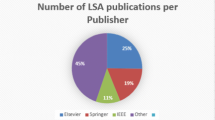Abstract
Task scheduling is an integrated component of computing. With the emergence of Grid and ubiquitous computing, new challenges appear in task scheduling based on properties such as security, quality of service, and lack of central control within distributed administrative domains. A Grid task scheduling framework must be able to deal with these issues. One of the goals of Grid task scheduling is to achieve high system throughput while matching applications with the available computing resources. This matching of resources in a non-deterministically shared heterogeneous environment leads to concerns over Quality of Service (QoS). In this paper a novel QoS guided task scheduling algorithm for Grid computing is introduced. The proposed novel algorithm is based on a general adaptive scheduling heuristics that includes QoS guidance. The algorithm is evaluated within a simulated Grid environment. The experimental results show that the new QoS guided Min-Min heuristic can lead to significant performance gain for a variety of applications. The approach is compared with others based on the quality of the prediction formulated by inaccurate information.
Similar content being viewed by others
References
Braun T D, Siegel H J, Beck Net al. A taxonomy for describing matching and scheduling heuristics for mixed-machine heterogeneous computing systems.IEEE Workshop on Advances in Parallel and Distributed Systems, West Lafayette, In, Oct., 1998, pp. 330–335.
Maheswaran M, Ali S, Siegel H Jet al. Dynamic mapping of a class of independent tasks onto heterogeneous computing systems. InThe 8th IEEE Heterogeneous Computing Workshop (HCW'99), San Juan, Puerto Rico, Apr., 1999, pp. 30–44.
Al-Saqabi K, Sarwar S, Saleh K. Distributed gang scheduling in networks of heterogeneous workstations.Computer Communications Journal, 1997, pp. 338–348.
Michael Litzkow, Miron Livny, Matt Mutka. Condor — A hunter of idle workstations. InProc. the 8th International Conference of Distributed Computing Systems, San Jose, CA, June, 1988, pp. 104–111.
Buyya R, Abramson D, Giddy J. Nimrod/G: An architecture of a resource management and scheduling system in a global computational Grid.High Performance Computing Asia 2000, Beijing, China, May 14–17, 2000, pp. 283–289.
Papadimitriou C. Complexity Theory. Addison Wesley, Reading, MA, 1994.
Xian-He Sun, Wu Ming. GHS: A performance prediction and task scheduling system for Grid computing. InProc. 2003 IEEE International Parallel and Distributed Processing Symposium, Nice, France, April, 2003.
Eric B Baum, Warren D Smith. Propagating distributions up directed acyclic graphs.Neural Computation, 1999, 11(1): 215–227.
Henri Casanova, Arnaud Legrand, Dmitrii Zagorodnov, Francine Berman. Heuristics for scheduling parameter sweep applications in grid environments. InProc. the 9th Hetergeneous Computing Workshop (HCW'2000), Cancun, Mexico, 2000, pp. 349–363.
Rich Wolski, Neil Spring, Jim Hayes. The network weather service: A distributed resource performance forecasting service for metacomputing.Journal of Future Generation Computing Systems, October, 1999, 15(5–6): 757–768.
Gong L, Sun X H, Waston E. Performance modeling and prediction of non-dedicated network computing.IEEE Trans. Computer, September, 2002, 51(9): 1041–1055.
Foster I, Roy A, Sander V. A quality of service architecture that combines resources reservation and application adaptation. InProc. the 8th Int. Workshop on Quality of Service, Pittsburgh, PA, USA, June 5–7, 2000, pp. 181–188.
Diot C, Seneviratne A. Quality of service in heterogeneous distributed systems. InProc. the 30th Hawaii International Conference on System Sciences HICSS30, Hawaii, January, 1997, pp. 238–247.
Gilbert C Sih, Edward A Lee. A compile-time scheduling heuristic for interconnection-constrained heterogeneous processor architectures.IEEE Trans. Parallel and Distributed Systems, Feb., 1993, 4: 175–187.
Czajkowski K, Foster I, Karonis Net al. A resource management architecture for metacomputing systems. InProc. IPPS/SPDP'98 Workshop on Job Scheduling Strategies for Parallel Processing, 1998, pp. 62–82.
Steve Chapin, Dimitrios, Katramatos, John Karpovich, Andrew Grimshaw. The legion resource management system. InProc. the 5th Workshop on Job Scheduling Strategies for Parallel Processing (JSSPP'99), in Conjunction with the International Parallel and Distributed Processing Symposium (IPDPS'99), Germany, April 1999, pp. 162–178.
David Fernández-Baca. Allocating modules to processors in a distributed system.IEEE Trans. Software Engineering, November, 1989, 15(11): 1427–1436.
Henri Casanova, Graziano Obertelli, Francine Berman, Rich Wolski. The AppLeS parameter sweep template: User-level middleware for the grid. InProc. the Super Computing Conference (SC'2000), Nov. 2000.
Freund R F, Gherrity M, Ambrosius Set al. Scheduling resources in multi-user, heterogenous, computing environments with SmartNet. InThe 7th IEEE Heterogeneous Computing Workshop (HCW'98), Orlando, Florida, USA, Mar. 1998, pp. 184–199.
Buyya R, Murshed M, Abramson D. A deadline and budget constrained cost-time optimization algorithm for scheduling task farming applications on global Grids. InThe 2002 International Conference on Parallel and Distributed Processing Techniques and Applications (PDPTA'02), Las Vegas, Nevada, USA, June 2002.
Rajesh Raman, Miron Livny, Marvin Solomon. Match-making: Distributed resource management for high throughput computing. InProc. the Seventh IEEE International Symposium on High Performance Distributed Computing, Chicago, IL, July 28–31, 1998, pp. 140–146.
Pinedo M. Scheduling: Theory, Algorithms and Systems. Prentice Hall, Englewood Cliffs, NJ, 1995.
Author information
Authors and Affiliations
Corresponding author
Additional information
This research was supported in part by the National Science Foundation, of USA under NSF Grant Nos.EIA-0224377, ANI-0123930, EIA-0130673, and by the Army Research Office under ARO Grant No. DAAD19-01-1-0432.
HE XiaoShan is currently a Ph.D. candidate in Illinois Institute of Technology, IL, USA. She received her M.S. degree in computer science from Illinois Institute of Technology in 2002, and her B.S. degree in computer engineering from University of Electronic Science and Technology of China in 1999. Her current research interests are scheduling algorithms in grid computing and pervasive computing.
SUN XianHe received his Ph.D. degree in computer science from Michigan State University in 1990. He was a staff scientist at ICASE, NASA Langley Research Center and was an associate professor in the Computer Science Department at Louisiana State University (LSU). Currently he is a professor and the director of the Scalable Computing Software Laboratory in the Computer Science Department at Illinois Institute of Technology (IIT), and a guest faculty at the Argonne National Laboratory. Dr. Sun's research interests include parallel and distributed processing, software system, performance evaluation, and scientific computing. He has published intensively in the field and his research search has been supported by DoD, DoE, NASA, NSF, and other government agencies. He is a senior member of IEEE, a member of ACM, New York Academy of Sciences, PHI KAPPA PHI, and has served and are serving as the chairman or on the program committee for a number of international conferences and workshops. He received the ONR and ASEE Certificate of Recognition award in 1999, and received the Best Paper Award from the International Conference on Parallel Processing (ICP01) in 2001.
Gregor von Laszewski is a scientist at Argonne National Laboratory and a fellow of the Computation Institute at University of Chicago. He received a Ph.D. degree in 1996 from Syracuse University. He is an expert in Grid computing. His current research interests are in the areas of parallel, distributed, and grid computing. Specifically, he is working on topics in the area of using commodity technologies within grid services, applications, and portals.
Rights and permissions
About this article
Cite this article
He, X., Sun, X. & von Laszewski, G. QoS guided Min-Min heuristic for grid task scheduling. J. Comput. Sci. & Technol. 18, 442–451 (2003). https://doi.org/10.1007/BF02948918
Received:
Revised:
Issue Date:
DOI: https://doi.org/10.1007/BF02948918




